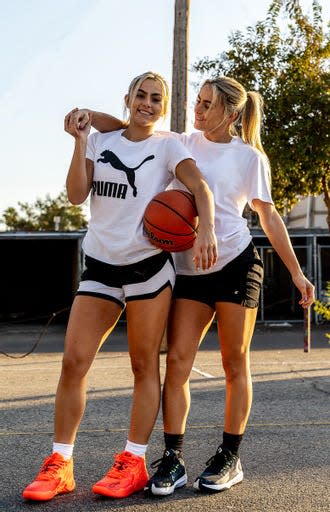After football, women's college basketball players landing most endorsement deals
The revenue floodgates started to swing open for college athletes last summer when the NCAA began to let student athletes profit off theirname, image and likeness (NIL) — and some of the biggest winners, as expected, are college football players.
An estimated 47.1% of NIL deals so far belong to football players, according to six months of data collected by Opendorse, a software company that provides a platform for athletes and their endorsement deals.
Women’s basketball, with 27.3% of NIL deals, ranks second. Men’s basketball is next, with 15.6% of the deals.
The remaining NIL deals are divided among women’s volleyball (2.4%), baseball (1.1%), men’s track and field (0.7%), women’s gymnastics (0.6%), women’s track and field (0.6%), women’s swimming and diving (0.5%) and softball (0.4%).

This data is based off transactions facilitated by Opendorse Desk — so it does not provide a complete picture and doesn't account for the nuances that vary by sport. However, it does provide an early snapshot of how — and which — student athletes will benefit from the new policy..
Women athletes seem to be relatively big winners — a sharp contrast from early criticisms that allowing athletes to profit from endorsements would further widen the gap between male and female athletes.
One of the biggest examples to contradict that claim is Paige Bueckers, the star University of Connecticut guard who signed two major endorsement deals, including with Gatorade. She also signed a deal with StockX, an online marketplace and clothing reseller. Bueckers is on track to make her return to the court after being out for two months following knee surgery in December.

Just one day before the NIL era began, Rutgers Athletics announced the launch of R Edge, an educational platform powered by Opendorse Ready. The platform aimed to assist Scarlet Knights student-athletes with the management and development of their NIL deals.
“The R Edge program is a major step in helping our student-athletes maximize their potential,” said Rutgers Athletic Director Pat Hobbs in a statement at the time. “We make every effort to prepare our student-athletes for success in the classroom and in competition. In this fast-changing landscape, we also want to do everything we can to prepare them to take advantage of these new opportunities.”
The goal of this platform, and others like it, is to offer student-athletes the chance to think about their futures outside of their chosen sport. During a preseason interview in November, Timothy Eatman, the acting head coach for Rutgers’ women’s basketball, alluded to NIL deals being a game changer this season.
Women's sports: More people than ever watch women's sports, but investment and media coverage still lag
Subscriber exclusive: Unsung heroes: These 12 gritty girls basketball players leave it all on the court
“It’s the things off the floor that we’re gearing up to do better with because of the fact that Rutgers has always been a program that said we’re going to prepare you for life, after basketball — whether you want to be a pro in basketball, whether you want to be a pro in life,” Eatman said. “It’s always been our mission to spoon feed our players to get them ready for life after basketball. But because of this situation now — name, image and likeness — it’s about right now.”
That new reality is already trickling down to younger ranks of competitive sport, including New Jersey's high school landscape.
In November, the New Jersey State Interscholastic Athletic Association approved a landmark proposal that allows high school athletes to profit off their name, image and likeness beginning this month. Jimmy Mullen, a St. Joseph junior heavyweight wrestler and football player, is believed to be one of the first high school athletes in the state to take advantage of the new rules. He recently inked a deal with Eat Clean Bro, a healthy food delivery business based in Freehold, that went into effect Jan. 1.
“They told me they would love for me to be the first high school athlete to do it from New Jersey,” Mullen said. “I knew I wanted to do something that would help me on the mat.”
Melanie Anzidei is a reporter for NorthJersey.com. To get unlimited access to the latest news, please subscribe or activate your digital account today.
Email: anzidei@northjersey.com
Twitter: @melanieanzidei
This article originally appeared on NorthJersey.com: College football, women's basketball players land most endorsements

